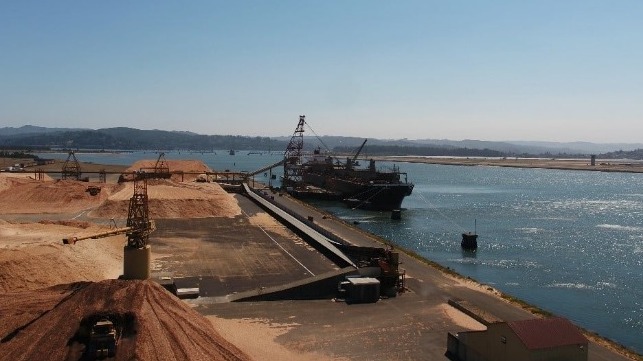
The small coastal port of Coos Bay, Oregon has a big new project in its near future. The port is partnering with industrial property developer NorthPoint on a plan to build a full-scale container terminal, potentially bringing in up to one million forty-foot boxes every year.
The announcement comes amidst an unprecedented boom in demand for container shipping, which has created record-setting backlogs at the U.S. West Coast’s primary import hubs in Los Angeles, Long Beach, Oakland and Seattle. The extreme supply-chain congestion has shippers looking at new alternatives – routing cargo through smaller ports, chartering their own ships, even sourcing their goods domestically – in order to avoid paying tens of thousands of dollars for each box shipped from China to the United States.
In a few years’ time, Coos Bay could provide a new alternative to the container traffic jam in Southern California. The port already operates its own 134-mile rail line to connect to Class I railroad service in Eugene, Oregon, on the other side of Oregon’s Coast Range, and it has invested heavily in upgrading the line for freight service (with significant federal financial support).
This key asset could be leveraged for more cargo volume if the port were to expand its waterfront facilities. Last week, the port announced that it had reached an agreement with Missouri-based NorthPoint Development – the largest industrial property developer in the United States – to build a multimodal container terminal at the port’s North Spit.
NorthPoint and the port estimate that the facility, once fully built out, would move over one million forty-foot containers annually in and out via the Coos Bay Rail Line. An existing rail spur on the North Spit would be extended to the project site, and additional infrastructure improvements along the rail line would be completed to accommodate double stack container cars. The partners are negotiating the terms of the deal and plan to have a contract in place by the end of the year.
The estimated $1 billion in construction expenditures would be an infusion for the region’s economy, and the project would bring hundreds of new jobs to an area with above-average levels of unemployment.
“With the recent closure of the Georgia Pacific Mill and other recent job loss in southwestern Oregon, the Port sees this as an opportunity to rebuild the economic base for the region,” said John Burns, Port CEO. “This is a project that has the potential to diversify the region’s economy and create employment opportunities both for the existing workforce and for future generations.”
The announcement also offers a new opportunity for the port after the indefinite pause of the controversial Jordan Cove LNG project. The Jordan Cove proposal would have seen the construction of a gas liquefaction terminal on the north side of the bay, but it encountered regulatory and public-relations difficulties before it could begin construction. Its backer – Canadian midstream firm Pembina – announced a pause in project development in April, and it recently missed several key permitting deadlines.
SOURCE READ THE FULL ARTICLE
https://www.maritime-executive.com/article/small-oregon-port-announces-plans-for-full-size-container-terminal